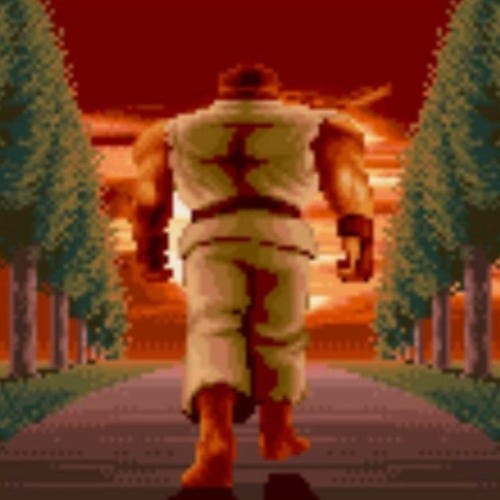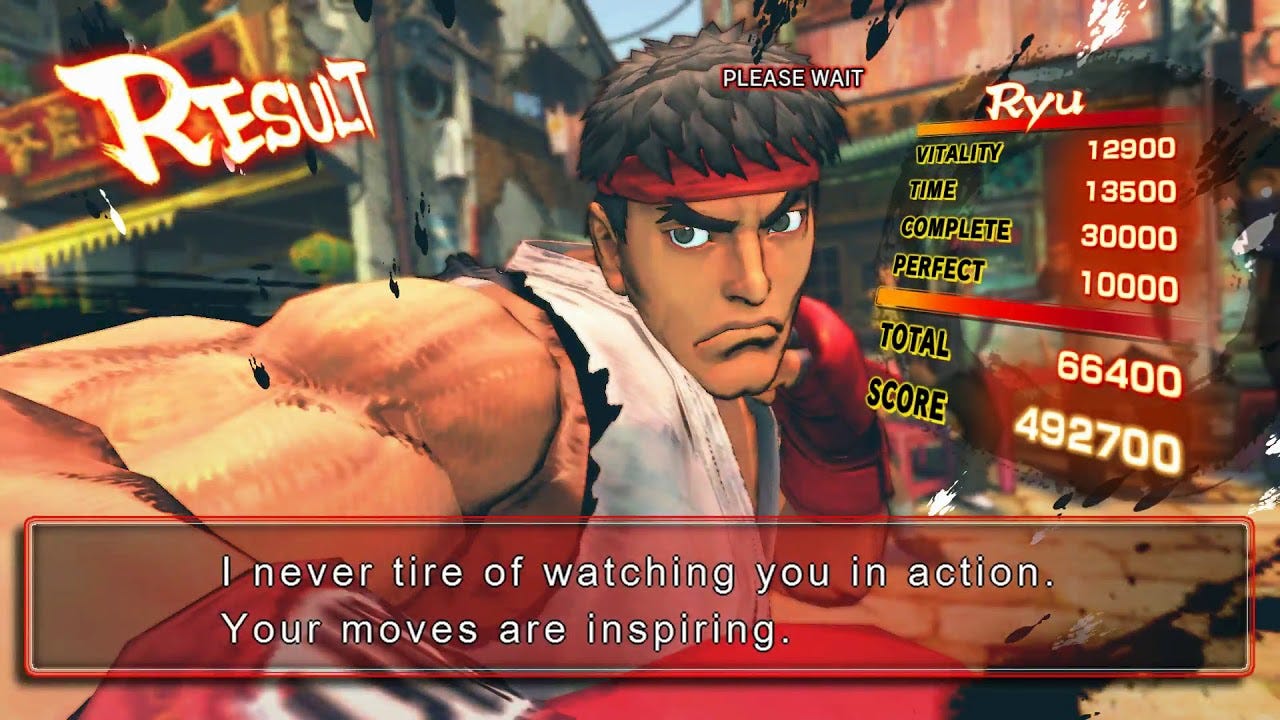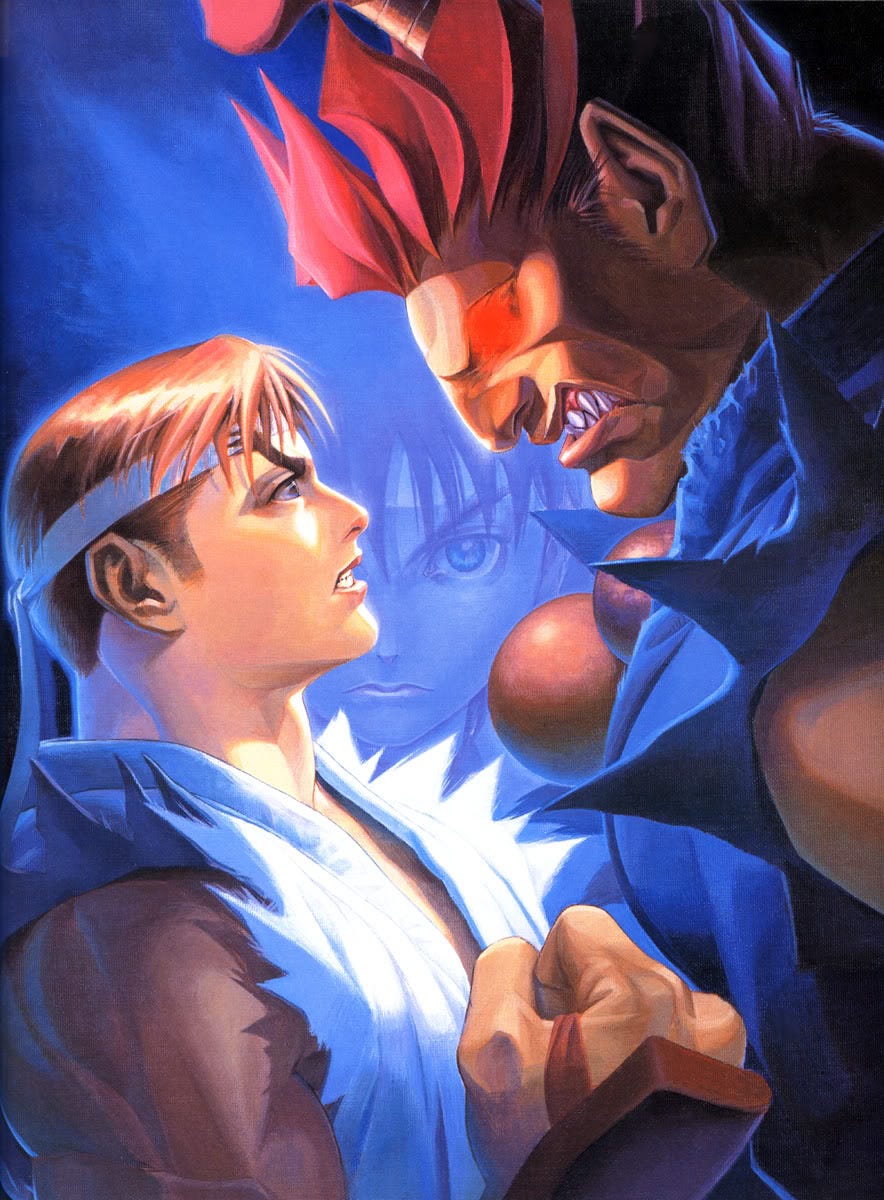A Masterclass in Stoicism, by Street Fighter's Ryu
How Capcom's wandering warrior embodies timeless lessons in discipline, resilience, and inner peace
There is no better antidote to modern life than Stoicism. And it’s easy to see why.
Stoicism has seen a huge resurgence in the past few years, especially after the pandemic. With life getting more complicated by the day with an endless torrent of financial crises, unemployment, and wars looming in the horizon, there’s comfort in a philosophical school that offers practical lessons for our everyday challenges.
I was lucky enough to cross paths with Stoic teachings a little earlier, around 2019.
It started with Epictetus’ Enchiridion, a short but incredibly powerful guide to life.
From there, I dove into Seneca’s letters (De Brevitate Vitae quickly became a personal favorite), and eventually into Meditations by Marcus Aurelius, a book I still revisit whenever life gets too chaotic for me to handle.
As Stoicism became more popular, it also started creeping into the corporate world. From entrepreneurs quoting Marcus Aurelius on LinkedIn to wellness apps promising “ancient wisdom for modern stress,” the philosophy of endurance and self-mastery is definitely having a cultural moment.
And honestly? That’s where I draw the line.
Instead of genuine practices of resilience, discipline, and perspective, Stoicism often got warped into empty slogans about “toughness” and “grind culture,” while the real lessons — sense of purpose, emotional clarity, living in alignment with your values — got lost along the way.
That’s why today, in true Boss Level style, we’re going back to the roots. Not with another LinkedIn platitude, but with one of the best examples of a true Stoic mindset that the gaming world ever produced: Ryu, from Street Fighter, a better Stoic than half the corporate world combined.
Let’s find out why — and how the journey of this wandering warrior can help you master your own.
Mastery Over Fame
“Ambition means tying your well-being to what other people say or do... Sanity means tying it to your own actions.” — Marcus Aurelius, Meditations
Let’s start by the main thing corporate gurus get wrong about Stoicism.
If you look at most fighting game characters, their motivations are pretty easy to understand. It would always fall in some variation of fame, glory, revenge, or the ultimate power. Even in Street Fighter, many fighters chase external rewards: winning tournaments, saving loved ones, seeking status, and so on.
But not Ryu. He wanders the world seeking only one thing: self-mastery.
He doesn’t care about titles, trophies, or the spotlight. In fact, after winning the second World Warrior tournament, he simply walks away, uninterested in the joys of victory. His journey is internal, not external.
And that’s pure Stoicism.
Epictetus reminds us:
“Never depend on the admiration of others. There is no strength in it. Personal merit cannot be derived from an external source.”
True success, in Stoic thinking, isn’t about what others recognize. It’s about whether you live according to your principles and your craft, even when no one is watching, even when there’s no applause.
Ryu embodies that better than everyone. Every battle he fights is a mirror, not a performance.
In modern careers, the temptation to chase external validation in the form of promotions, likes, awards, and public praise is overwhelming. But mastery, real mastery, demands that we focus on our inner standards, not outer rewards.
The real, outlasting success is a consequence of you learning this valuable lesson.
💡 Bottom Line: If your goal is admiration, you’ll always be a slave to someone else’s opinion. If your goal is mastery, you’ll be free. Just like Ryu.
The Real Opponent Is Yourself
“The greatest victory is to conquer yourself.” — Epictetus, Discourses
The most compelling thing about Ryu is that his journey isn’t about defeating others. It’s about defeating his own weaknesses.
In the Street Fighter series, Ryu’s most dangerous adversary isn’t Sagat, or Akuma, or even M. Bison. It’s the Satsui no Hado, the dark force within himself that tempts him to abandon control, discipline, and honor for raw, brutal power.
This internal struggle defines who Ryu is. He trains not just to become stronger, but to resist the temptation to lose himself to anger, pride, or fear. Yes, he slipped once when fighting Sagat at the end of the first tournament, but that moment of weakness revealed the Satsui no Hado to him. Since then, his life’s mission has been to understand and master that darkness.
This is one of the best lessons Stoicism teach us: the dominance of our destructive feelings to live a dignified life.
Marcus Aurelius reminds us:
“You have power over your mind — not outside events. Realize this, and you will find strength.”
In the Stoic worldview, there are two kinds of things:
Things that are within our power: our thoughts, impulses, desires, and judgments.
And things that are beyond our power: our health, reputation, property, roles, and outcomes.
The world may try to provoke us, but how we respond is always within our control.
That’s why the real battles happen internally: against your impulses, fears, and ego.
Victory is less about dominating others and more about mastering yourself.
Ryu’s fights are mirrors — tests of his character, not displays of brute force.
In professional life, it's tempting to think your biggest enemy is “the competition”: the rival company, the difficult client, the colleague who always challenges your ideas. But most of the time, your real opponent is your own doubt, your impatience, your fear of failure, or your addiction to external validation.
💡 Bottom Line: The most important fight you’ll ever face isn’t against the world. It’s against yourself. As Ryu says: “The answer lies in the heart of the battle.” And the one who wins that battle, wins everything.
Control Over Emotions
“If you are distressed by anything external, the pain is not due to the thing itself, but to your estimate of it, and this you have the power to revoke at any moment.” — Marcus Aurelius, Meditations
Back in the early '90s, when Street Fighter II took over arcades, Ryu’s victory quotes were a bit more… aggressive.
His now-iconic line “You must defeat Sheng Long to stand a chance” became a legendary mistranslation, but it still captured something: Ryu was focused, but not necessarily serene.
As the series evolved and his character matured, that changed. By Street Fighter IV, his tone was far more humble and introspective:
And that became one of his best traits: Ryu learned to handle both victory and defeat with the same calm, the same humility, the same drive to improve. No gloating when he wins, no tantrums when he loses, no excuses when things don’t go his way.
Whether he's defeating a powerful opponent or falling short in battle, Ryu stays composed. He sees every outcome as part of the journey, a stepping stone, not a defining moment.
In Street Fighter, it would be easy for Ryu to let anger consume him after a loss, or pride inflate him after a big win. But he doesn’t. He controls his emotions, refusing to let external events disturb his inner balance.
Seneca reminds us:
“We suffer more often in imagination than in reality.”
A loss is only catastrophic if your ego magnifies it. A setback is only a defeat if you let frustration control your mind.
In real life, we often let external events like a lost opportunity, harsh criticism, or an unexpected failure shake us emotionally. But Stoicism teaches, and Ryu demonstrates, that real power lies in choosing your response.
You can acknowledge pain without being ruled by it. You can feel joy without becoming arrogant. You can pursue growth without tying your identity to any single outcome.
It all comes down to your perception and how your emotions are trained to respond.
💡 Bottom Line: Mastering your emotions is the first step toward mastering yourself.
Stay steady, win or lose — and like Ryu, you’ll always find a way forward.
Persistence Through Hardship
“Difficulties strengthen the mind, as labor does the body.” — Seneca, Letters to Lucilius
Ryu’s life is defined by one thing above all: constant, deliberate struggle.
Unlike many characters in Street Fighter who have clear missions (revenge, rescue, conquest), Ryu’s journey is endless. He trains, fights, learns, loses, adapts, and starts again. There is no "final destination" for him, no moment when he finally declares victory and retires, no perfect tournament win that "completes" him.
Of course, it would be naive not to mention his battles against Akuma as pivotal moments in his life, but even those legendary confrontations are just milestones, reminders that mastery is a moving target, and that hardship is a constant companion, not a sign of failure.
This is a mindset aligned with one of Stoicism’s central pillars: hardship isn’t something to fear, but something to train against.
Marcus Aurelius famously framed life as a series of tests designed for our growth:
“The impediment to action advances action. What stands in the way becomes the way.”
In other words, obstacles aren’t interruptions to your path. They are the path.
Ryu doesn’t avoid failure, exhaustion, or difficulty. He embraces them as necessary conditions for his evolution, and that’s something that feels increasingly rare in modern society.
Today, it's easy to believe that hitting a rough patch like a failed project, a layoff, or a rejected proposal means you’re on the wrong track. But often, it’s the opposite: struggles are evidence that you’re engaging with something meaningful.
Of course, sometimes you realize you’ve taken a wrong turn and need to pivot.
But if you have a clear goal, and your choices are aligned with the path you believe in, giving up at the first obstacle is the real mistake.
The professionals who endure aren’t the ones who avoid hardship. They’re the ones who persist through it, like a wandering warrior refining their form with every battle.
💡 Bottom Line: Growth lives on the other side of hardship. You don’t level up by finding easy routes. You level up by persisting when things get hard and trusting that the struggle is part of the design.
The Journey Is the Reward
Finally, we arrive at the biggest flaw in the corporate Stoicism gibberish: mistaking achievements for the journey to accomplish them.
For most of us, success is framed as a destination with clearly defined goals. Get the job. Win the championship. Secure the promotion. Retire wealthy.
Follow this recipe, repeated ad nauseam by performance coaches and LinkedInfluencers, and your life becomes a checklist. A series of boxes to tick in an endless chase toward something out there.
But Ryu shows us a different way.
He doesn’t fight to “arrive” anywhere. He fights because the act of improving, struggling, testing himself, and growing is the reward.
There is no moment when Ryu stops, looks at the horizon, and says, “I’m done.”
Even when he wins, he simply bows, thanks his opponent for the battle, and moves forward to the next test.
This echoes one of the most profound lessons from Stoicism: happiness doesn’t come from arriving, but from engaging fully with the path.
Seneca captured this beautifully:
“It is not that we have a short time to live, but that we waste much of it.”
When you believe life starts only after you achieve something big like the next job, the next title, or the next milestone, you waste the precious life that’s happening right now.
The Stoic (and the true warrior) finds meaning in the process itself. You improve because it’s worthy. You endure because it’s noble. You grow because that is how you honor the chance to live and act in the world.
Ryu’s journey reminds us that you don’t need external trophies to validate your effort. The real victory is the person you become while walking the path.
Or, as he says: “I walk my own path, regardless of what direction other men take.”
💡 Bottom Line: Don’t live only for the finish lines. Find meaning in the battles, the challenges, and the growth along the way.
Conclusion: A Warrior’s Path Is Never Finished
Ryu doesn’t chase trophies or cling to victories. He walks forward, through hardship, temptation, failure, and growth, guided not by what the world demands, but by a deeper internal compass.
That’s Stoicism at its core. It’s not about being emotionless. It’s about choosing discipline over impulse, clarity over noise, and mastery over approval.
Whether you’re in the middle of a difficult project, facing personal setbacks, or simply feeling lost in a world obsessed with fast wins and flashy rewards, let Ryu remind you:
Focus on mastery, not recognition.
Fight the enemy within, not just the one in front of you.
Control your emotions. Don’t let them control you.
Endure hardship. It’s how strength is forged.
And most of all: find meaning not just in outcomes, but in the journey itself.
You don’t need to be a Street Fighter fan to understand the value of that mindset. You just need to be someone who’s trying to grow — with intention, with clarity, and with a quiet kind of strength.
Now I want to hear from you: what game character has unexpectedly taught you a lesson about life, leadership, or resilience?
As aways, drop it in the comments. I’d love to hear your take!
Let’s keep leveling up, one boss level at a time.













Growing up around the Street Fighter series, I never thought we’d be pulling valuable life lessons from Ryu. And yet, here we are. You just took me to school today and I feel like I learned something. Well done 👍🏾
Gosh, framing this discussion around Ryu was such a good idea — deep and thought-provoking characters are one of Street Fighter's underrated strengths, and Ryu may as well be a Seneca for the twenty-first-century video gamer.
Anyway, on the subject of Japanese games about street-fighting with surprisingly nuanced characterization, I've gotta throw Kazuma Kiryu into the discussion. There's this one scene from Yakuza 5 that's stuck with me for over a decade: arguing with Masaru Watase, who claims that Kiryu is ultimately driven by lust for power and violence, Kiryu says "You consider the Yakuza a way to die. To me, being Yakuza is a way to live... we walk the same path, but you're barreling toward death, while I fight for life." He might be my pick for the most inspiringly resilient video game character.
Fantastic piece, and a very welcome antidote to the pseudo-Stoicism that's colonized the Western understanding of corporate work.